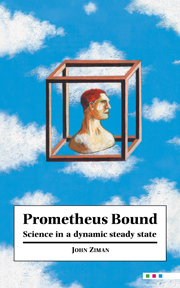Book contents
- Frontmatter
- Contents
- Preface
- 1 What is happening to science?
- 2 Scientific and technological progress
- 3 Sophistication and collectivization
- 4 Transition to a new regime
- 5 Allocation of resources
- 6 Institutional responses to change
- 7 Scientific careers
- 8 Science without frontiers
- 9 Steering through the buzzword blizzard
- Further reading
- Index
Preface
Published online by Cambridge University Press: 05 August 2012
- Frontmatter
- Contents
- Preface
- 1 What is happening to science?
- 2 Scientific and technological progress
- 3 Sophistication and collectivization
- 4 Transition to a new regime
- 5 Allocation of resources
- 6 Institutional responses to change
- 7 Scientific careers
- 8 Science without frontiers
- 9 Steering through the buzzword blizzard
- Further reading
- Index
Summary
Science is reaching its ‘limits to growth’. It is expected to contribute increasingly to national prosperity, yet national budgets can no longer support further expansion to explore tempting new research opportunities, by larger research teams, equipped with increasingly sophisticated apparatus. As a result, science is going through a radical structural transition to a much more tightly organized, rationalized and managed social institution. Knowledge-creation, the acme of individual enterprise, is being collectivized.
This transition is pervasive, interlocking, ubiquitous and permanent. It affects the whole research system, from the everyday details of laboratory life to the politics of national budgets. Changes in one part of the system, such as the abolition of academic tenure, have repercussions elsewhere, for example in the commercial exploitation of scientific discoveries. A new policy language of ‘accountability’, ‘evaluation’, ‘input and output indicators’, ‘priority-setting’, ‘selectivity’, ‘critical mass’, etc. has become commonplace throughout the world, from Finland to Brazil, from Poland to New Zealand, from the United States to Papua New Guinea. Indeed, science is becoming a truly international enterprise, organized systematically on a global scale.
Many scientists and scholars look back regretfully to a more relaxed and spacious environment for academic research. But nostalgia is a fruitless sentiment. What all scientists know is that science cannot thrive without social space for personal initiative and creativity, time for ideas to grow to maturity, openness to debate and criticism, hospitality towards innovation, and respect for specialized expertise.
- Type
- Chapter
- Information
- Prometheus Bound , pp. vii - xPublisher: Cambridge University PressPrint publication year: 1994

